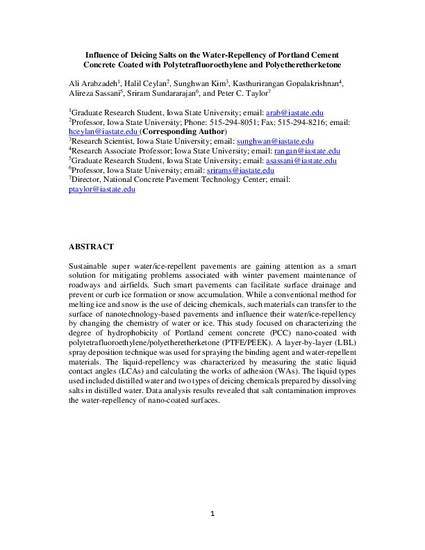
Sustainable super water/ice-repellent pavements are gaining attention as a smart solution for mitigating problems associated with winter pavement maintenance of roadways and airfields. Such smart pavements can facilitate surface drainage and prevent or curb ice formation or snow accumulation. While a conventional method for melting ice and snow is the use of deicing chemicals, such materials can transfer to the surface of nanotechnology-based pavements and influence their water/icerepellency by changing the chemistry of water or ice. This study focused on characterizing the degree of hydrophobicity of Portland cement concrete (PCC) nanocoated with polytetrafluoroethylene/polyetheretherketone (PTFE/PEEK). A layer-bylayer (LBL) spray deposition technique was used for spraying the binding agent and water-repellent materials. The liquid-repellency was characterized by measuring the static liquid contact angles (LCAs) and calculating the works of adhesion (WA). The liquid types used included distilled water and two types of deicing chemicals prepared by dissolving salts in distilled water. Data analysis results revealed that salt contamination improves the water-repellency of nano-coated surfaces.
Available at: http://works.bepress.com/sriram_sundararajan/28/

This is a manuscript of a proceeding published as Arabzadeh, Ali, Halil Ceylan, Sunghwan Kim, Kasthurirangan Gopalakrishnan, Alireza Sassani, Sriram Sundararajan, Peter C. Taylor, and Abdullah Abdullah. "Influence of Deicing Salts on the Water-Repellency of Portland Cement Concrete Coated with Polytetrafluoroethylene and Polyetheretherketone." International Conference on Highway Pavements and Airfield Technology, August 27–30, 2017, Philadelphia, Pennsylvania. In Airfield and Highway Pavements 2017: Pavement Innovation and Sustainability, pp. 217-227. 2017. doi: 10.1061/9780784480946.020. Posted with permission.